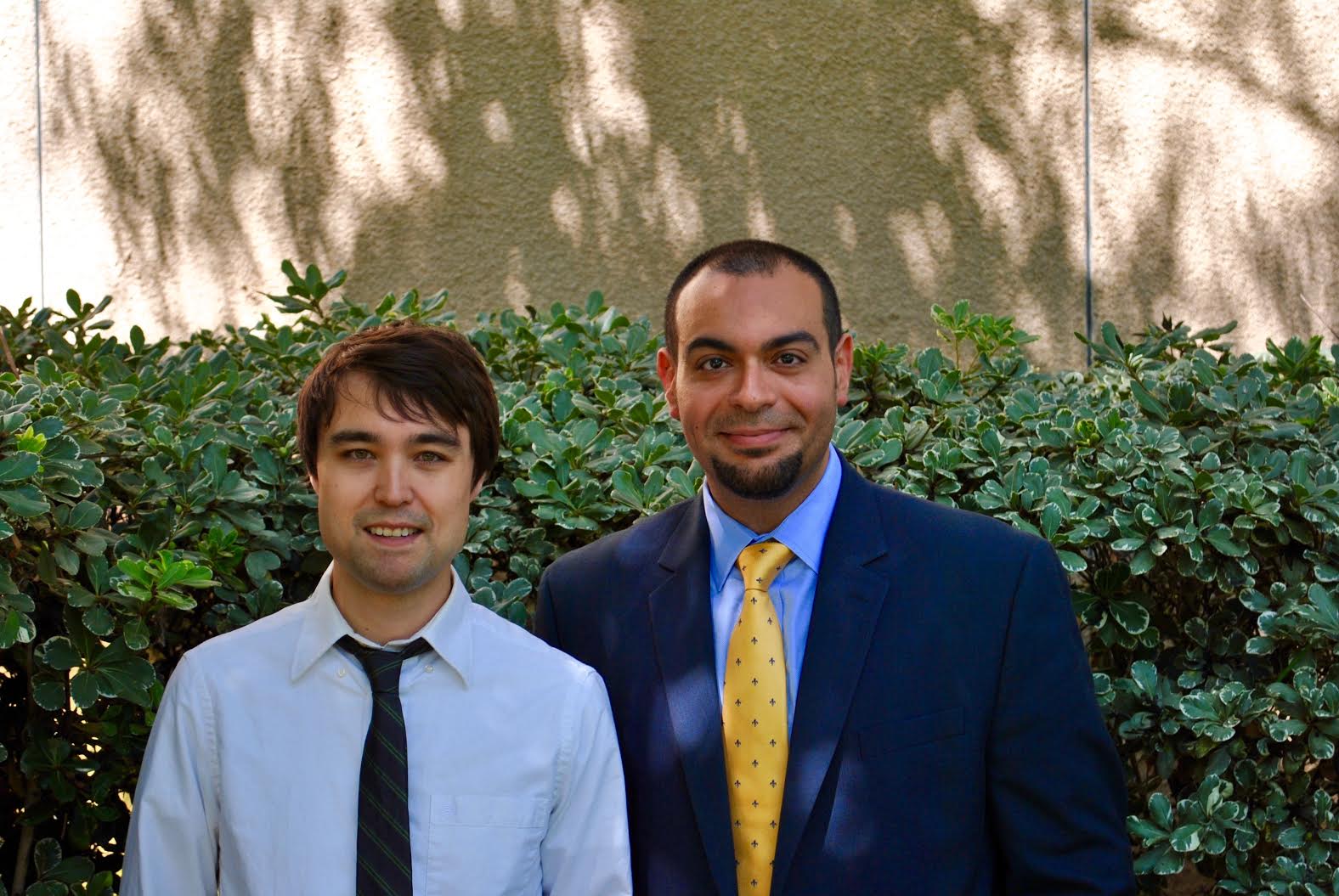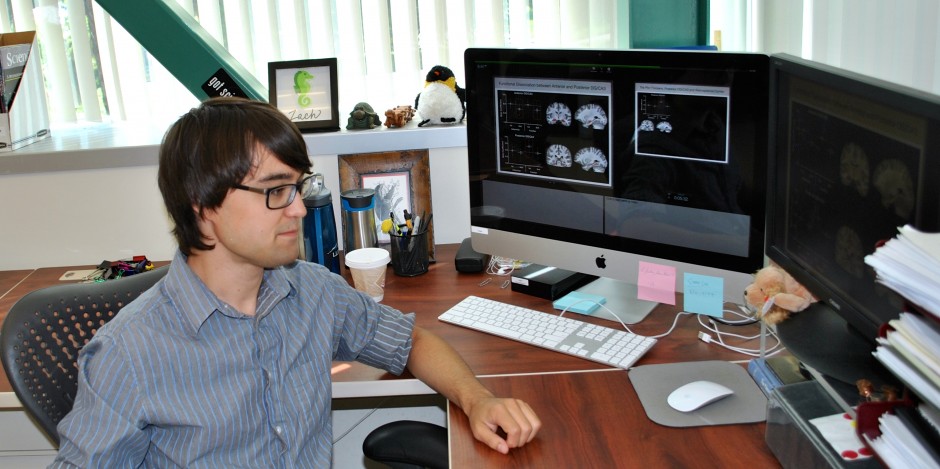

Postdoctoral Researcher at UC Davis (PI: Charan Ranganath)
Earned Ph.D. on August 18, 2017
Biosketch:
I graduated with a B.S. in Psychology and a B.A. in Philosophy from the University of Alabama at Birmingham. My interests lie the neurobiological basis of memory, and how memory processes change as we age. The specific research I conduct has two main focuses. First, I am interested in the division of labor in the medial temporal lobe as episodic memories are encoded, stored, and retrieved. One such division is object/item vs. spatial/context memory, which recruit somewhat distinct networks in the medial temporal lobes, both converging on the hippocampus. We are presently using this an object vs. spatial memory discrimination task in conjunction with high-resolution structural and functional MRI in young vs. older adults to examine the dynamics between the hippocampus and upstream medial temporal lobe cortices that support episodic memory, and how these dynamics change in neurocognitive aging. Second, I am interested in factors that can influence the fidelity or integrity of items in memory. Toward this end, Dr. Yassa and I have developed and are currently testing Competitive Trace Theory, an account of what happens to episodic memories over time and why.
Download Curriculum Vitae
Awards and Honors:
- Chancellor’s Club Fund for Excellence Fellowship
- UCI MIND Outstanding Predoctoral Scholar Award
- James L. McGaugh Award for Excellence in Research
- ARCS/Roche Foundations Scholar Award
- William F. Holcomb Scholarship, UCI School of Biological Sciences
- National Science Foundation Graduate Research Fellowship
- Leadership Alliance Summer Research Fellowship (completed at Vanderbilt University)
- First Place, UAB Ost Undergraduate Research Competition
- UAB Department of Psychology Achievement Award
Publications:
(Please click the title or contact Zach if you would like to read a paper!)
- Reagh, Z.M. Joche, J.A., Tustison, N.J., Delisle, D., Murray, E.A., & Yassa, M.A. (2017). Anterolateral entorhinal-hippocampal imbalance in older adults disrupts object pattern separation. Preprint at BioRxiv. DOI: 10.1101/162925
- Stark, S.M., Reagh, Z.M., Yassa, M.A., & Stark, C.E.L. (2017). What’s in a context? Cautions, limitations, and potential paths forward. Neuroscience Letters
- Reagh, Z.M. & Yassa, M.A. (2017). Selective vulnerability of episodic memory systems in the aging brain. F1000Research. DOI: 12688/f1000research.10652.1
- Reagh, Z.M., Ho, H.D., Leal, S.L., Noche, J.A., Chun, A., Murray, E.A., Yassa, M.A.(2015) Greater loss of object than spatial mnemonic discrimination in aged adults. Hippocampus. DOI: 10.1002/hipo.22562.
- Reagh, Z.M., Watabe, J., Ly, M., Murray, E., & Yassa, M.A. (2014). Dissociated signals in human dentate gyrus and CA3 predict different facets of recognition memory. The Journal of Neuroscience. DOI: 10.1523/JNEUROSCI.2779-14.2014
- Reagh, Z.M. & Yassa, M.A. (2014). Object and spatial mnemonic interference differentially engage lateral and medial entorhinal cortex in humans. Proceedings of the National Academy of Sciences. DOI: 10.1073/pnas.1411250111
- Schurgin, M.W., Reagh, Z.M., Yassa, M.A., & Flombaum, J.I. (2014) Building tolerant long-term memories through (object) persistence. The Journal of Vision. DOI: 10.1167/14.10.30
- Reagh, Z.M. & Yassa, M.A. (2014). Repetition strengthens target recognition but impairs similar lure discrimination: Evidence for trace competition. Learning and Memory. DOI 10.1101/lm.03546.114
- Reagh, Z.M., Roberts, J.M., Ly, M., DiProspero, N., Murray, E., & Yassa, M.A. (2013). Spatial discrimination deficits as a function of mnemonic interference in aged adults with and without memory impairment. Hippocampus. DOI: 10.1002/hipo.22224
- Schurgin, M.W., Reagh, Z.M., Yassa, M.A., Flombaum, J.I. (2013) Spatiotemporal continuity alters long-term memory representations. Visual Cognition. DOI: 10.1080/13506285.2013.844969.
- Yassa, M.A., Reagh, Z.M. (2013). Competitive Trace Theory: a role for the hippocampus in contextual interference during retrieval. Frontiers in Behavioral Neuroscience. DOI: 10.3389/fnbeh.2013.00107
- Reagh, Z.M., Knight, D.C. (2013). Negative, but not positive emotional images modulate the startle response independent of conscious awareness. Emotion. DOI: 10.1037/a0032286.
Abstracts, Posters, and Presentations:
- Reagh, Z.M. (2014). Episodic memory in the aging human brain. Coalition for National Science Funding Advocacy Day; Washington, DC.
- Reagh, Z.M. (2014). Extrahippocampal Contributions to Hippocampal Pattern Separation. Center for the Neurobiology of Learning and Memory Spring Meeting; Irvine, CA.
- Reagh, Z.M. & Yassa, M.A. (2013). A division of labor in the medial temporal lobe: Pattern separation of object identity vs. spatial location. Society for Neuroscience Annual Meeting; San Diego, CA.
- Yoncheva, Y.N., Reagh, Z.M., & McCandliss, B.D. (2012). Isolating the ripples of recognition within stimulus-driven SSVEP waves: topographic insights into word and face identity processing. Society for Neuroscience Annual Meeting; New Orleans, LA.
- Reagh, Z.M. & Knight, D.C. (2012). Negative, but not Positive Emotional Images Modulate the Startle Response Independent of Conscious Awareness. Ost Undergraduate Research Competition at the University of Alabama at Birmingham; Birmingham, AL.
- Yoncheva, Y.N., Reagh, Z.M., & McCandliss, B.D. (2011). Isolating the ripples of recognition within stimulus-driven SSVEP waves: topographic insights into word and face identity processing. Cognitive Neuroscience Society Annual Meeting; Chicago, IL.
- Reagh, Z.M. & Knight, D.C. (2011). Effect of Perception of Emotional Valence on the Startle Response in Humans. Bevill Conference on Cognition and Cognitive Disorders; Birmingham, AL.
- Reagh, Z.M. & Knight, D.C. (2011). Effect of Perception of Emotional Valence on the Startle Response in Humans. Pavlovian Society Annual Meeting; Milwaukee, WI.
- Reagh, Z.M., Yoncheva, Y.N., & McCandliss, B.D. (2011). Steady State Visual Evoked Potentials Reveal Hemispheric Differences for Visual Categories. Vanderbilt Summer Science Academy Poster Session; Vanderbilt University.
- Reagh, Z.M., Yoncheva, Y.N., & McCandliss, B.D. (2011). Steady State Visual Evoked Potentials Reveal Hemispheric Differences for Visual Categories. Leadership Alliance National Symposium; Greenwich, CT.
- Reagh, Z.M. & Knight, D.C. (2011). Effect of Perception of Emotional Valence on the Startle Response in Humans. UAB Undergraduate Research Expo; University of Alabama at Birmingham.
